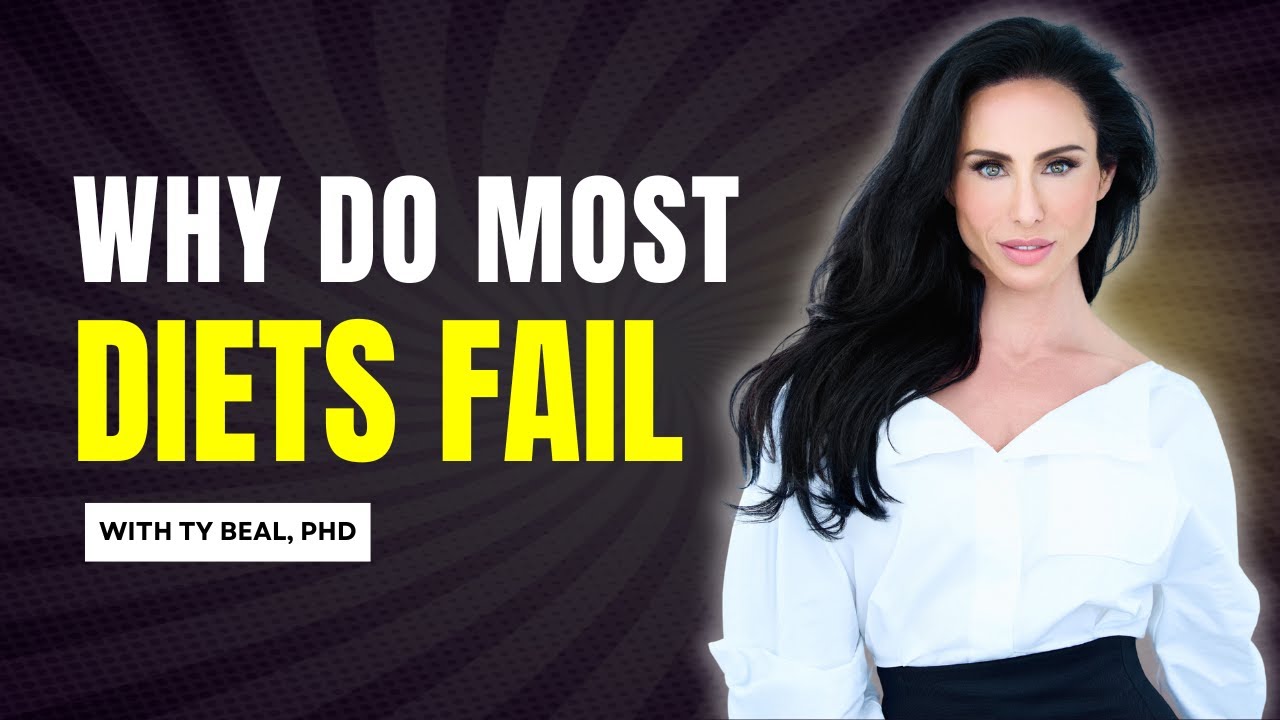- Most diets fail due to nutrient deficiencies that undermine metabolic health and weight loss efforts.
- Insulin sensitivity plays a crucial role in how bodies react to different diets and nutrient absorption.
- The psychological and social factors impacting dieting success are often overlooked.
- The role of specific nutrients and their deficiencies in metabolic diseases is significant yet frequently underestimated.
- Strategies for addressing nutrient deficiencies can improve diet effectiveness and overall well-being.
The science of diet failure is deeply entwined with the concept of nutrient deficiencies. Many individuals embark on dieting journeys with high hopes, only to be met with frustration. A critical, yet often overlooked component, is the role nutrients play in metabolic health and weight loss. Dr. Ty Beal, in his insights into why diets fail, emphasizes the crucial connection between nutrition, metabolic functions, and the body’s response to calorie-restricted regimens.
Nutrient deficiencies can disrupt metabolic processes, leading to insulin resistance and impaired energy metabolism. For instance, a deficiency in chromium or magnesium can alter insulin sensitivity, making it harder for the body to process glucose effectively. This, in turn, leads to weight gain or stalled weight loss, regardless of calorie intake. Vitamin D deficiency has been linked to increased fat storage due to its role in insulin function and inflammation reduction.
Insulin sensitivity is a major player in a successful diet. Foods that maintain high nutrient content support insulin function, making it easier for glucose to enter cells and be used for energy. When diets lack nutrients that support this process, the body struggles. As a result, even with reduced calorie consumption, individuals may experience fatigue and reduced metabolic rate, diminishing overall diet effectiveness.
Social and psychological influences also play a significant role in the success or failure of diets. The stress of calorie restriction coupled with societal pressures can lead to emotional eating, further disrupting metabolic balance. The emphasis on short-term results often overshadows the importance of a balanced, nutrient-rich diet. Sustainable weight loss requires a holistic approach, considering both mental health and nutritional adequacy.
The impact of specific nutrient deficiencies on metabolic diseases cannot be underestimated. Iron deficiency, for example, affects metabolic rate and energy levels, often leading to lethargy and decreased physical activity, which are counterproductive to weight loss efforts. Omega-3 fatty acids are crucial for reducing inflammation and supporting heart health, yet many diets fail to provide adequate amounts, thereby increasing the risk of inflammation-driven weight gain.
Strategies to correct nutrient deficiencies can significantly boost diet success rates. Incorporating whole foods rich in essential vitamins and minerals is key. Lean proteins, colorful vegetables, and whole grains provide a broad spectrum of nutrients necessary for efficient metabolic function. Supplementation may also be beneficial, especially when specific deficiencies are identified through blood tests or dietary assessments.
Incorporating these insights into daily life can provide the foundation for effective, long-term weight management. Understanding the delicate balance between nutrition and metabolism is essential. By prioritizing nutrient density, improving insulin sensitivity, and acknowledging the psychological facets of dieting, individuals can achieve healthier, more sustainable outcomes.
Ultimately, the science of nutrient deficiencies highlights the importance of a comprehensive, informed approach to dieting. By focusing on nutrition rather than mere calorie reduction, people can foster a healthier relationship with food and enhance their journey to well-being.
*****
Source Description
In this episode, I’m joined by Dr. Ty Beal—global nutrition researcher and Senior Technical Specialist at the Global Alliance for Improved Nutrition (GAIN)—to uncover the hidden epidemic of micronutrient deficiencies worldwide. From food access and affordability to ultra-processed diets and nutrient bioavailability, we explore how modern food systems are failing billions and what needs to change to truly make the world healthier.
We cover:
Why 3 billion people can’t afford a healthy diet—and how that affects nutrient status
The most common global and U.S. micronutrient deficiencies (and why they’re often overlooked)
Why women and children are especially vulnerable during pregnancy, infancy, and adolescence
The role of ultra-processed foods in displacing nutrient-rich options
How bioavailability, anti-nutrients, and the “food matrix” impact your real nutrient intake
Why plant-based diets aren’t always safer—and the hidden risks of nutrient shortfalls
The science behind biofortification, food system reform, and why animal-source foods stil matter
What the U.S. gets wrong about food guidelines, global trade, and nutritional equity
Whether you care about maternal health, child development, or just making better nutrition decisions, this is a vital conversation about nutrient density, food justice, and global health.
Who is Dr. Ty Beal?
Dr. Ty Beal is a Senior Technical Specialist and global nutrition scientist at the Global Alliance for Improved Nutrition (GAIN) where he leads research on global food systems, nutrient inadequacy, and diet quality. His work bridges science and policy to help address the world’s most pressing nutrition challenges—especially among vulnerable populations. He’s published extensively on micronutrient gaps, ultra-processed foods, and global dietary patterns, and is one of the most cited voices on nutrition equity in developing nations.
This episode is brought to you by:
LMNT – Code DRLYON for a free LMNT Sample Pack! → https://drinklmnt.com/drlyon
Timeline – Get 10% OFF Mitopure with code DRLYON → https://timelinenutrition.com/LYON
Ned – Get 15% off with code DRLYON → https://helloned.com
Our Place – Get 10% off sitewide with code DRLYON → https://fromourplace.com/DRLYON
Find Dr. Ty Beal at:
GAIN Health – https://www.gainhealth.org/ty-beal
Google Scholar – https://scholar.google.com/citations?user=3y5uHRIAAAAJ&hl=en
X (Twitter) – https://x.com/TyRBeal
LinkedIn – https://www.linkedin.com/in/tybeal/
Find Me at:
Instagram:@drgabriellelyon
TikTok: @drgabriellelyon
Facebook: facebook.com/doctorgabriellelyon
YouTube: youtube.com/@DrGabrielleLyon
X (Twitter): x.com/drgabriellelyon
Apply to become a patient – https://drgabriellelyon.com/new-patient-inquiry/
Join my weekly newsletter – https://institute-for-muscle-centric-medicine.ck.page
Get my book – https://drgabriellelyon.com/forever-strong/
Timestamps:
00:00 – Why global food systems are broken—and why it matters in the U.S. too
02:06 – 3 billion people can’t afford a healthy diet: what that really means
05:16 – The most common micronutrient deficiencies in women and children
09:10 – How early nutrient gaps impact growth, cognition, and lifelong health
13:28 – The hidden risks of plant-based diets for nutrient shortfalls
17:35 – Food matrix vs. supplements: why real food still matters most
20:47 – How ultra-processed foods displace nutrient-dense options
29:42 – Are Americans really eating too much meat? The data says otherwise
36:00 – What’s wrong with global dietary guidelines and who sets them
44:06 – How to produce nutrient-dense food without harming ecosystems
50:00 – Biofortification: breeding crops to fight nutrient deficiencies
52:15 – What balance of plant and animal foods actually supports health
Disclaimer: The Dr. Gabrielle Lyon Podcast and YouTube are for general information purposes only and do not constitute the practice of medicine, nursing, or other professional health care services, including the giving of medical advice, and no doctor/patient relationship is formed. The use of information on this podcast, YouTube, or materials linked from this podcast or YouTube is at the user’s own risk. The content of this podcast is not intended to be a substitute for professional medical advice, diagnosis, or treatment. Users should not disregard or delay in obtaining medical advice for any medical condition they may have and should seek the assistance of their health care professional for any such conditions.


